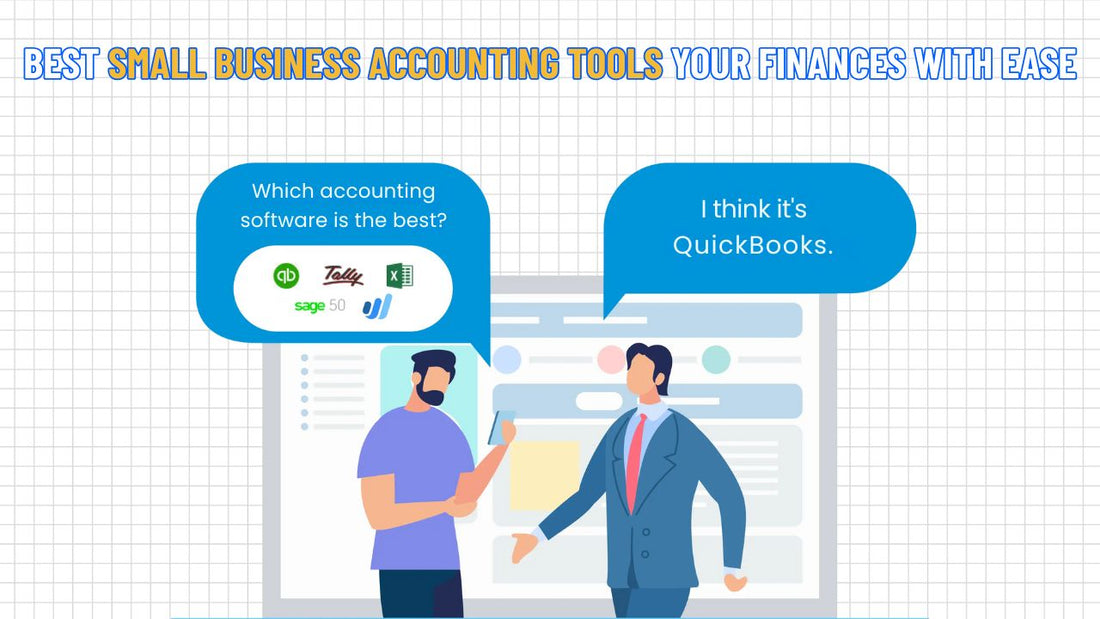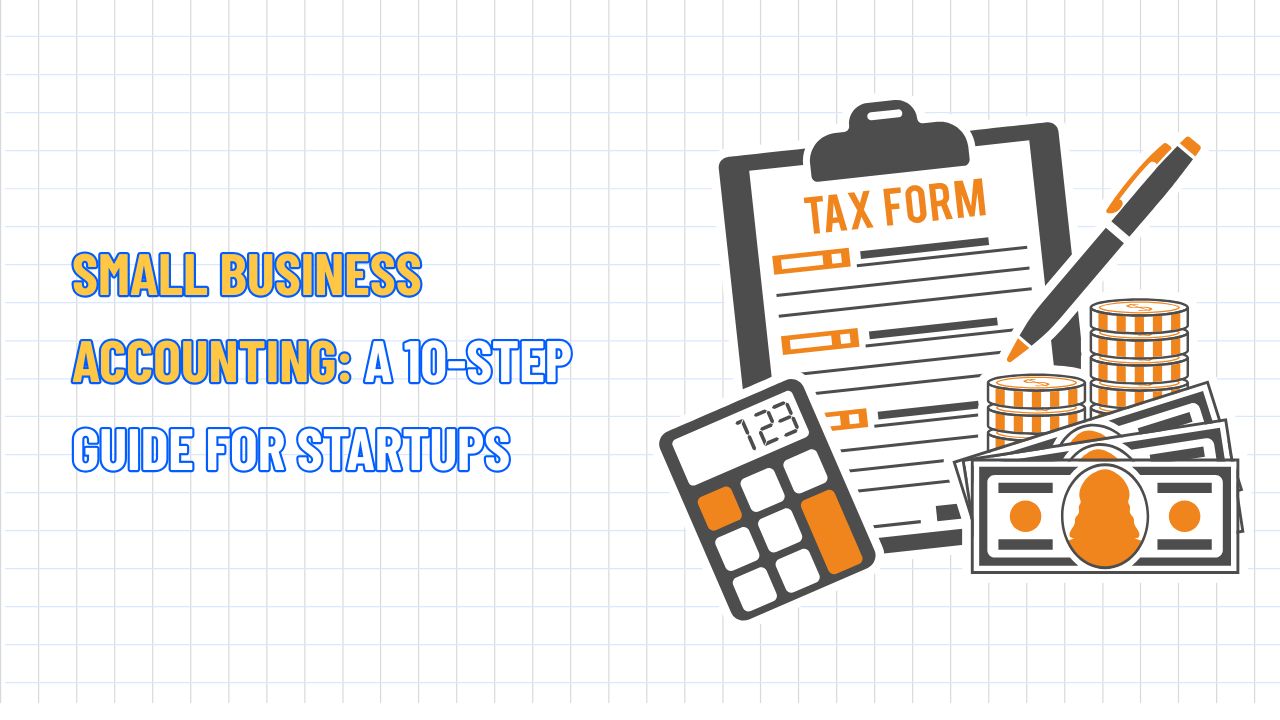Best Small Business Accounting Tools Your Finances with Ease
Table of Contents Hide
Choosing the right small business accounting tools can make a big difference, saving you time, reducing errors, and providing clear insights into your financial health. NextSky is guide below can help you explore the best software options tailored to your needs this year.
Top 8 leading small business accounting tools
To help you make the best decision, here are the top 8 accounting software options for small businesses, evaluated based on usability and real-world fit.
1. QuickBooks Online
QuickBooks Online continues to hold its position as the top choice thanks to its flexibility, scalability, and robust feature set. This software supports professional double-entry accounting and integrates with over 650 apps like PayPal and Shopify for real-time financial data tracking. It's ideal for businesses transitioning from solo operations to larger teams.

Key features:
- Unlimited invoicing, estimates, and expense tracking.
- Advanced inventory management and time tracking.
- Over 50 customizable financial reports, including profit and loss statements and balance sheets.
- Seamless integration with e-commerce platforms like Shopify is perfect for NextSky's target audience.
- Mobile app for invoicing and expense uploads on the go.
Pros: User-friendly interface; strong scalability; rich ecosystem of integrations.
Cons: Higher cost than free tools; some advanced features locked behind premium plans.
Rating: 4.5/5 (G2)
Pricing: Starting at $20/month (after promo), with a 30-day free trial.
Best for: Small and medium-sized businesses, startups, or growing companies needing a professional, flexible accounting platform.
Read more: What is A Small Business? A Comprehensive Guide to Definition
2. Wave
Wave stands out as one of the most potent free accounting tools, offering a comprehensive feature set for small businesses and freelancers who want to stay professional without breaking the bank. However, advanced features like automated bank sync cost about $16/month.
Key features:
- Unlimited invoicing and estimates, with direct integration to PayPal and Stripe.
- Basic financial reports like profit & loss and balance sheets.
- Convenient mobile app for receipt scanning and invoicing anywhere.
- Multi-currency support is ideal for freelancers and global operations.
Pros: Completely free for core features; easy to use; mobile-optimized and user-friendly interface.
Cons: Limited advanced features; add-on costs for payroll and bank connections.
Rating: 4.4/5 (G2)
Pricing: Free for accounting, invoicing, and receipt scanning; paid add-ons available.
Best for: Freelancers, solopreneurs, and micro-businesses needing basic, efficient, and cost-free accounting tools.
Read more: Top 9+ Best Ecommerce Platforms for Small Businesses
3. Zoho Books
This software delivers powerful features, including expense tracking, professional invoicing, and tax compliance management. Zoho Books integrates smoothly with popular payment gateways like PayPal and Stripe, plus Zoho's diverse app ecosystem.

Key features:
- Free plan supports up to 1,000 invoices/year and one user.
- Over 25 detailed financial reports, including 1099 forms and sales tax reports.
- Smart expense tracking with receipt scanning and mileage logging.
- Multi-language, multi-currency invoicing for global businesses.
Pros: Free for micro-businesses; user-friendly interface; multi-platform integrations and high automation.
Cons: Steeper learning curve for non-Zoho users; free plan limits advanced features.
Rating: 4.6/5 (G2)
Pricing: Free for businesses under $50,000/year revenue; paid plans start at $15/month (annual billing).
Best for: Micro-businesses, freelancers, and small teams seeking affordable yet feature-rich professional accounting software.
4. Xero
Xero impresses with unlimited user support across all plans, making it especially ideal for small businesses needing flexible team collaboration. Its seamless Shopify integration makes it a reliable choice for e-commerce businesses in the NextSky ecosystem.
Key features:
- Unlimited users on every plan.
- In-depth financial reporting and analytics for quick decision-making.
- Efficient inventory and fixed asset management.
- Mobile app for invoicing and expense tracking on the go.
Pros: Multi-user collaboration; broad integrations; detailed and accurate reporting.
Cons: Time tracking is tied to projects only; recurring transaction templates can be complex for beginners.
Rating: 4.2/5 (G2)
Pricing: Premium plans start at $13/month and go up to $70/month.
Best for: Small businesses and teams needing flexible collaboration, comprehensive accounting, and smooth e-commerce integrations.
5. FreshBooks
FreshBooks is built specifically for professional service providers, offering a sleek, intuitive interface with robust and accurate invoicing. The platform helps businesses track billable hours, expenses, and client retainers, all in a visual, reliable system.

Key features:
- Professional invoicing with online payments via credit/debit cards or PayPal.
- Detailed project time and expense tracking, easily convertible to invoices with a few clicks.
- Robust mobile app for invoicing, expense capture, and cash flow checks on the move.
- Basic income and expense reports for quick financial overviews.
Pros: Intuitive design; smooth workflows; professional invoicing process; mobile app optimized for busy users.
Cons: Limited inventory tracking; costs rise with added team members.
Rating: 4.6/5 (G2).
Pricing: Starting at $19/month, with a 30-day free trial.
Best for: Freelancers, consultants, and small service-based businesses seeking a simple yet powerful solution for efficient, professional financial management.
Read more: The Ultimate Guide to Small Business Expense Tracking
6. Sage 50 Accounting
Sage 50 Accounting is a desktop-based tool excelling in-depth inventory management, ideal for businesses with complex warehousing needs. Its Microsoft 365 integration enhances remote access and collaboration, despite lacking a modern mobile app.
Key features:
- Advanced inventory management with LIFO and FIFO methods.
- Over 100 customizable financial reports for all analytical needs.
- Detailed transaction forms and records for full business activity tracking.
- Tight integration with Microsoft 365 is available only on Windows.
Pros: Powerful inventory tools; comprehensive reporting; suited for mid-sized manufacturing or retail.
Cons: No mobile app; dated interface; Windows-only support.
Rating: 3.9/5 (G2).
Pricing: Starting at $45.75/month for one user (Premium plan).
Best for: Businesses requiring precise, detailed inventory management without needing mobile access.
7. Akaunting
Akaunting is an entirely free, open-source accounting tool offering flexible customization to fit unique business needs. The self-hosted version supports unlimited invoicing and expense tracking, especially appealing to tech-savvy users seeking complete financial data control.

Key features:
- Customizable invoicing with multiple payment methods, from bank transfers to crypto.
- Automated expense tracking via intelligent receipt scanning and recognition.
- Scheduled automated financial reports to streamline periodic accounting.
- Multi-currency support for global operations.
Pros: Free; highly customizable; supports diverse payments; absolute data control.
Cons: It requires technical knowledge for setup and maintenance, and has a less user-friendly interface than commercial platforms.
Rating: 4.0/5 (G2).
Pricing: Free for self-hosted; cloud plans start at $12/month.
Best for: Freelancers and tech-oriented businesses wanting a customizable, transparent, and fully autonomous accounting solution.
Read more: Budgeting for Small Business: A Step-by-Step Guide to Success
8. GnuCash
GnuCash is an open-source, fully offline accounting software providing businesses with absolute data security and comprehensive financial control. Though free, it features professional double-entry accounting, multi-currency support, custom reports and charts, and a traditional checkbook-style interface for easy transaction management.
Key features:
- Professional double-entry accounting with multi-currency support.
- Unlimited invoice creation and management, including payments and receivables.
- Checkbook-style register for detailed transaction tracking.
- Custom reports and charts for intuitive financial analysis.
Pros: Completely free; ironclad offline security; deep accounting features for small businesses or individuals.
Cons: No cloud access; traditional interface may feel dated for newcomers.
Rating: 4.1/5 (G2).
Pricing: Free for desktop (Windows, macOS, Linux).
Best for: Businesses or individuals prioritizing data privacy, offline work, and a reliable, internet-independent accounting platform.
Why small businesses need accounting software
Small business owners often wear many hats, and accounting can quickly become time-consuming. According to a National Federation of Independent Business survey, 68% of small business owners using accounting software report improved financial accuracy and save an average of 10 hours per week on administrative tasks.
Accounting software for small businesses provides:
- Automation: Streamlines invoicing, expense categorization, and bank reconciliation.
- Real-time insights: Instant access to profit & loss, balance sheets, and cash flow reports.
- Scalability: Grows with tools that adapt to increasing transaction volumes and complexity.
- Compliance: Ensures accurate tax reporting, including 1099 forms and sales tax calculations.
- Affordability: Many options, including free accounting software, fit tight budgets.
Key factors to consider when choosing accounting software
Selecting the best accounting software for small businesses depends on your specific needs. Here are the important factors to weigh:
- Scale and complexity: Freelancers and solopreneurs should opt for Wave, Zoho Books (free), or FreshBooks for simplicity and low cost. For growing businesses, QuickBooks Online or Xero offers optimal scalability and collaboration.
- Budget: For cost savings, Wave, Zoho Books, Akaunting, and GnuCash provide effective free solutions. For deeper needs, QuickBooks, Xero, and FreshBooks offer paid plans from $13–$20/month, which is ideal for advanced features.
- Ease of use: FreshBooks and Wave are perfect for beginners with their straightforward setups. QuickBooks Online and Xero require more initial configuration for a professional, comprehensive financial system.
- Integrations: If you sell via Shopify, choose QuickBooks Online or Xero for automated invoice, revenue, and data syncing. Zoho Books suits businesses in the Zoho ecosystem that need multiple payment gateway connections.
- Mobile access: QuickBooks, Wave, and Xero all offer convenient mobile apps for on-the-go financial management. Sage 50 Accounting and GnuCash lack this, limiting mobile workflows.
- Tax compliance: QuickBooks Online and Zoho Books excel in handling 1099 reports, sales tax, and multi-currency, easing global regulatory adherence.
How to set up your accounting software
Getting started with small business accounting software is a key step for efficient financial management, but thorough preparation maximizes its potential.
- Choose the right plan: Select based on business size, budget, and needed features. Popular options like QuickBooks, FreshBooks, or Xero offer free trials to test before committing.
- Set up initial accounts: Provide basics like business type, fiscal year, and industry so the software auto-configures for your setup.
- Connect financial accounts: Link banks and payment processors like PayPal or Stripe for automatic transaction imports, minimizing errors, and saving time.
- Customize advanced settings: Enable features like inventory tracking, multi-currency, or tax reporting per your needs.
- Import initial data: Use CSV/XLS files to load customer lists, vendors, or products for quick, accurate setup.
- Create your first transactions: Start with an invoice or expense entry to familiarize yourself with the interface, ensuring all financial activity is recorded accurately from day one.
Pro tip: Leverage the software's support resources and tutorials. QuickBooks and Xero offer rich help centers, while Wave provides detailed beginner guides to master workflows quickly and use the tool effectively.
Trends in small business accounting software for 2025
As small businesses evolve, so do their accounting tools. Here are the key trends shaping the industry in 2025:
- AI-driven automation: Tools like Xero and QuickBooks use AI for transaction categorization and cash flow forecasting, cutting manual work.
- E-commerce integrations: With online stores rising, software like QuickBooks and Xero offers seamless Shopify syncing, aligning with NextSky's e-commerce focus.
- Mobile-first design: Apps like FreshBooks and Wave prioritize mobile access for on-the-go management.
- Sustainability reporting: New tools include environmental impact tracking, appealing to eco-conscious businesses.
- Open-source growth: Solutions like Akaunting gain popularity for flexibility and cost savings.
Choosing the best accounting software for small businesses depends on your needs, budget, and growth plans. By investing in the right small business accounting tool, you can simplify finances, ensure tax compliance, and gain actionable insights to fuel growth. Explore free trials or free plans to test these options and find the perfect fit for your business in 2025.











